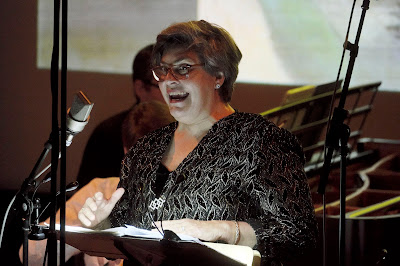Louise Page, Soprano
Edward Neeman, Piano
Anna McDonald &
Christopher Latham, Violin
James Wannan, Viola
Paul Stender, Cello
Luminescence Chamber
Singers
James Fairfax
Theatre, National Gallery of Australia to 11 August
Reviewed by Len Power
10 August 2018
On the centenary of the end of World War One, ‘The Flowers
of War’ shows what price Europe measured solely in terms of artistic loss. According to the program, “‘The Lost Jewels’
is a statement of support for the aims of the EU and its role in normalising
relations through diplomatic means”.
Weaving together music and art by the artists whose lives
were cut shut in that period of history, ‘The Lost Jewels’ was a memorable and
moving experience. The stage setting
with poppies strewn on the floor and the dim, shadowy lighting created a
reflective atmosphere for the works performed.
 |
| Left to right: Anna McDonald, Edward Neeman, Christopher Latham, Louise Page, James Wannan and Paul Stender |
Louise Page sang her many songs with great beauty and precision. The highlight of her performance was the ‘The
Maiden and the Nightingale and Final Scene – Love Death’ aria from ‘Goyescas’
by Enrique Granados. This highly
emotional and complex work was a real test for a singer and Louise Page
conquered it superbly. In addition, her
singing of the final work that closed the concert, ‘Old Buddhist Prayer’ by
Lili Boulanger, was intensely moving and its simple message of peace for all
was clearly heartfelt by Page. Listening
to her, it’s hard to accept that she has announced her retirement for later
this year.
 |
| Louise Page |
Pianist, Edward Neeman, excelled with his solo playing of works by Debussy, Fragoso and Devaere and the full quintet of musicians shone with their playing of opening work by the Australian FS Kelly as well as works by the European composers Magnard, Butterworth and others. The Luminescence Singers provided a haunting and delicate accompaniment to Louise Page in the final work by Boulanger.
 |
| The Luminescence Singers with Louise Page and the Quintet |
Paintings projected behind the performers were very well
chosen. They matched the mood of the
music items.
While the music was intensely moving, stirring a feeling of
anger and sadness at the loss of all of these brilliant artists in that time
period, the message in the Boulanger work ultimately expressed our hopes for a
peaceful world for the future.
Photos by Peter
Hislop
Len Power’s reviews
are also broadcast in his ‘On Stage’ performing arts radio program on Mondays
and Wednesdays from 3.30pm on Artsound FM 92.7.
